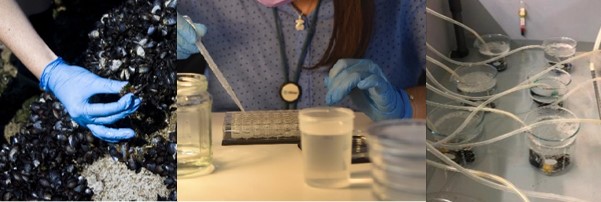The farming of bivalves, one of the most commercially important shellfish in the world, has increased in the recent decades, becoming an opportunity to respond to the growing requirements of food supply and nutrition security. This is because they not only represent a nutrient-rich meat, but their production also has a low environmental footprint. However, bivalves are filter-feeding species that accumulate marine toxins, such as the diarrhetic shellfish toxin (DST), which can be transferred through the food web to humans causing shellfish poisoning. Up to date, the strategies to guarantee the safety of bivalves for human consumption are monitoring the toxin levels and restricting shellfish harvesting. Hence, it is relevant to develop strategies to reduce marine biotoxins in these aquatic organisms. It has been reported that the nuclear receptor Pregnane X (PXR) is involved in the metabolism of a large group of substances, including toxic compounds. Nevertheless, little is known about this receptor and its role in the metabolism of marine toxins in invertebrates. Therefore, this project at CIIMAR (Portugal) will involve in vivo modulation of DST biotransformation and elimination. Furthermore, molecular biology and chemical techniques will be applied to investigate the putative role of PXR in marine biotoxins metabolism and identify PXR agonist compounds that could enhance the natural depuration of these toxic compounds. The project’s outcome will enhance our understanding of the metabolic pathways involved in the depuration of DST in bivalves and will facilitate the development of strategies to ensure seafood safety.

